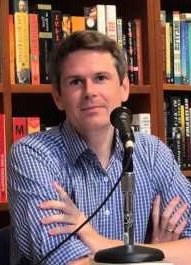Note: This collection was this year’s WINNER of the PEN/Robert W. Bingham Prize and was NOMINATED for the Frank O’Connor International Short Story Prize.
“If there’s going to be a battle over who’s got more Chinese pride, I want to be on the side that destroyed feudalism and liberated the peasants, not the side that oppressed the masses. I’m just saying, if it weren’t for the Red Guards, we wouldn’t be here today….You think you’d be wearing gel in your hair and silk boxers [otherwise]? You’d be dragging a plow while some landlord beat you with a cane.” – Slick Lips, “An Event at Horizon Trading Company.”
 Although Jack Livings’s experiences in China were in the 1990s, when he was a student and then an English teacher, the life he lived there and the knowledge he gained from his conferences with students about their writing have stood him in good stead with this stunning and dramatic story collection. As he tells the Wall Street Journal, the title story, “The Dog,” is a story told to him by one of his students, a story he embellishes in his own writing here, about a weekend trip to the countryside taken by his student and her family. Also on the trip was her father’s cousin Zheng, a sleazy operator in the import/export business who “moved in dangerous circles” in the city and who brought with him a dog which he owned jointly with her father. They had been using the dog for gambling in illegal dog races in Beijing, but because of a government crackdown, the men need to get rid of the dog; hence, the weekend trip to the countryside and a planned family barbecue.
Although Jack Livings’s experiences in China were in the 1990s, when he was a student and then an English teacher, the life he lived there and the knowledge he gained from his conferences with students about their writing have stood him in good stead with this stunning and dramatic story collection. As he tells the Wall Street Journal, the title story, “The Dog,” is a story told to him by one of his students, a story he embellishes in his own writing here, about a weekend trip to the countryside taken by his student and her family. Also on the trip was her father’s cousin Zheng, a sleazy operator in the import/export business who “moved in dangerous circles” in the city and who brought with him a dog which he owned jointly with her father. They had been using the dog for gambling in illegal dog races in Beijing, but because of a government crackdown, the men need to get rid of the dog; hence, the weekend trip to the countryside and a planned family barbecue.
The bleak ironies and absurdities of this story and its surprising descriptions epitomize the author’s style as he creates seven additional stories of personal crisis from all parts of China, including some areas and cultures with which most of us in the West are unfamiliar. “The Heir,” the second story, takes place in Ganjiakou, a subdistrict of Beijing where Omar, a Uyghur from Mongolia, and his henchmen run the market known as Uyghurville, taking on the hated Chinese whenever necessary. Even Omar fears his men, however. “Not to expect treachery from [them] would have been to display a gross misunderstanding of human nature.” Omar is hoping his twenty-five-year-old grandson Anwher will rise to help him in the continuing fight for leadership and control. All Anwher wants, however, is to escape to Urumqi, a Chinese city just west of the border with Mongolia, almost two thousand miles northwest of Beijing, populated by Uyghurs and Chinese Muslims. The capture and torture of Anwher and the behavior of Omar show the conflicts within these culturally different groups and the difficulty of survival for anyone who is “different.”
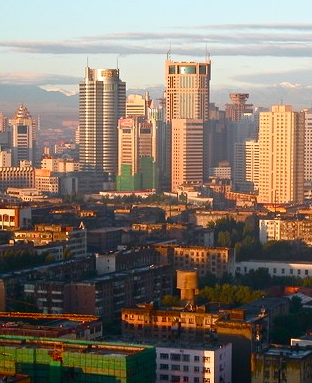
Urumqi, a city of two million Mongolian people, about two thousand miles NW of Beijing, is the dream of Anwher in “The Heir”
Throughout these stories, the author continually blurs the lines between victim and intimidator, while also varying his styles and approach to his material. In “Mountain of Swords, Sea of Fire,” a vibrant satire which takes place in the newsroom of the Guangzhou Post, Ning, a staid and comfortable veteran with forty years’ experience must write a retirement speech for someone he does not admire, at the same time that he is dealing with a generational conflict with a youngster who has poached the big story to which he has devoted much research. Black humor abounds.
“Donate” tells of Yang, a relatively wealthy factory owner living in a “suburb” when an earthquake hits. By the time the news of the quake hits the newspapers, “Most people were lost in their own thoughts and looked to Yang [like] a bunch of unplugged televisions.” His daughter comes home from school and wants a donation, but she has no idea of who will oversee its use. Other groups soon sponsor their own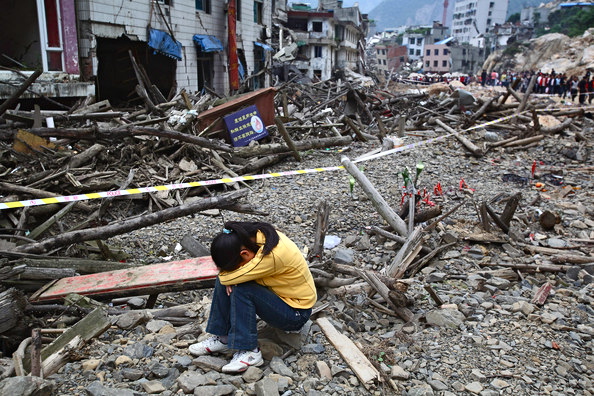 fund-raising programs, which quickly spark a competition among the most successful businessmen to maintain their honor with large donations. Yang donates blood, and the next day is encouraged to donate plasma, too, while also donating even more money and finally offering to match donations at his company. His only requirement is that the money go to the Red Cross and not to those who regard donations as personal bribes. No one is ever satisfied here.
fund-raising programs, which quickly spark a competition among the most successful businessmen to maintain their honor with large donations. Yang donates blood, and the next day is encouraged to donate plasma, too, while also donating even more money and finally offering to match donations at his company. His only requirement is that the money go to the Red Cross and not to those who regard donations as personal bribes. No one is ever satisfied here.
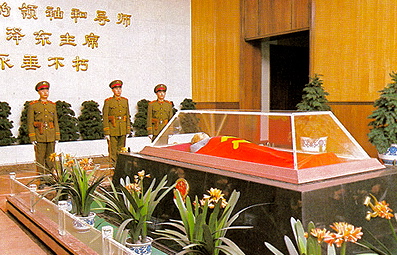 “The Crystal Sarcophagus,” perhaps the most involving and impressive story, begins in September 1976, with the death of Chairman Mao. Zhou Yu-qing, who works at the Glass Institute along with forty other of the best glass workers in the country, has been summoned for a meeting where the Vice Mayor announces that “As a reward for your exemplary service to the People’s Republic, you are instructed to build the crystal sarcophagus of the founder of the People’s Republic, Chairman of the Central Committee of the Chinese Communist Party Mao Zedong!” Then he announces that this goal must be met within ten months. The sarcophagus must be earthquake proof, glare-proof, airtight, and most important, “the crystal must be pure to 99.9999 percent.” The craftsmen work with gloves that are burning, some go almost blind from fumes, others are injured by accumulating vapors, and there are endless failures. When the sarcophagus is finished, even the reader wonders whether it was worth the efforts.
“The Crystal Sarcophagus,” perhaps the most involving and impressive story, begins in September 1976, with the death of Chairman Mao. Zhou Yu-qing, who works at the Glass Institute along with forty other of the best glass workers in the country, has been summoned for a meeting where the Vice Mayor announces that “As a reward for your exemplary service to the People’s Republic, you are instructed to build the crystal sarcophagus of the founder of the People’s Republic, Chairman of the Central Committee of the Chinese Communist Party Mao Zedong!” Then he announces that this goal must be met within ten months. The sarcophagus must be earthquake proof, glare-proof, airtight, and most important, “the crystal must be pure to 99.9999 percent.” The craftsmen work with gloves that are burning, some go almost blind from fumes, others are injured by accumulating vapors, and there are endless failures. When the sarcophagus is finished, even the reader wonders whether it was worth the efforts.
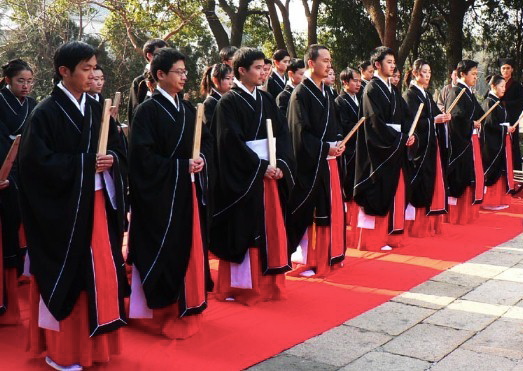
Academics wearing Hanfu clothing, a reminder of traditions and old styles, seen in “An Event at Horizon Trading”
“An Event at Horizon Trading Company,” the only first person story, is told in profane and conversational language and features more dark humor, as many employees decide to emulate the boss when they discover he was at a traditional Hanfu ceremony. Before long, the majority of employees are wearing long traditional Hanfu robes in a nationalistic style. Two rebels, however, decide to wear revolutionary red star liberation caps, olive green Zhongshan suits, and brown belts, and carry Mao’s Little Red Book in their chest pockets, in revenge. Once again, irony rules and individualism fails.
Unique descriptions enhance the clarity and precision of the language and add impact to the themes. Ning, the old man in “Mountain of Swords, Sea of Fire,” asks a smart-alecky woman, “Is it mating season for your species?” A ten-year-old purse-snatcher in “The Pocketbook” is “wastewater wrung from the sponge of the world.” The workers building the crystal sarcophagus “would attack [the job] blindly, with full red hearts like a cavalry riding directly into enemy cannons.” In “Switchback,” where there is an accident in which a bike rider is killed by a cargo truck, “a pack of old Muslim ladies whose faces were studies in erosion” emerged from the back. Livings is a master of technique, style, and thematic development who has used his experience from twenty years ago in this gem of a story collection. I can hardly wait for him to put his experience of living in contemporary America over the past twenty years to use in writing a future novel.
Photos, in order: The author’s photo is from http://article.wn.com
Urumqi, near the Mongolian border, and populated by Uyghurs, is shown on http://chinaedition.com
The earthquake in Wenchuan appears on http://www.zimbio.com
Chairman Mao’s Mausoleum, with its crystal coffin, may be found on http://www.oaklandcemeteryburials.com/
Traditional Hanfu clothing, worn here by academics, became popular with employees of the Horizon Trading Company in the story of that name: https://en.wikipedia.org/wiki/Hanfu
The departure area of the Beijing airport is shown on http://www.flightcentre.com
ARC: Picador
